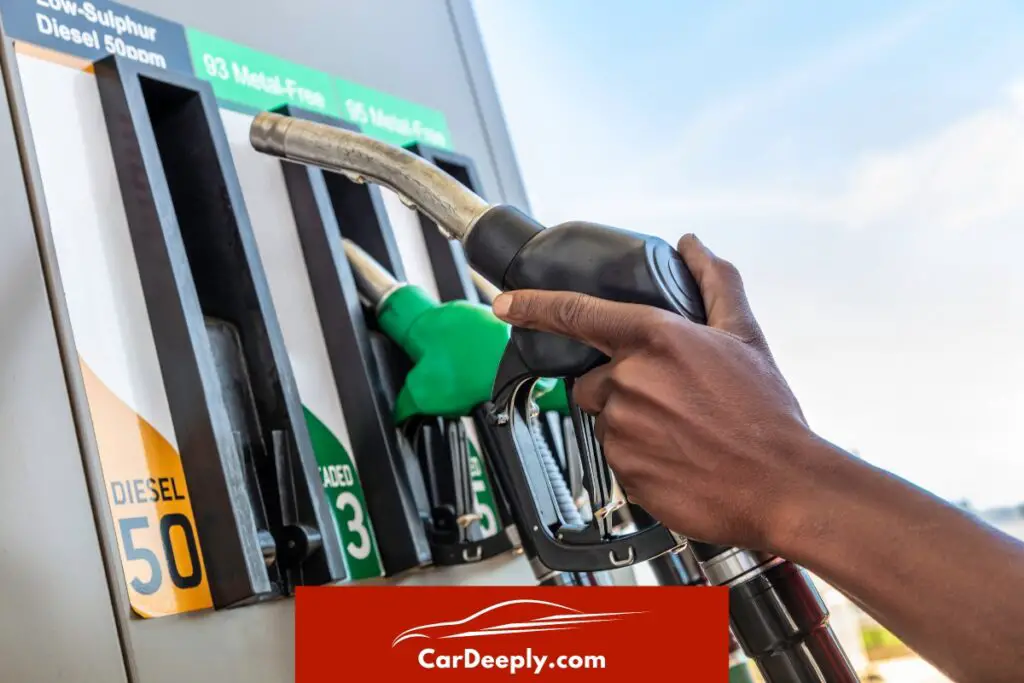Navigating the complex world of petrol and diesel vehicles can be daunting. This comprehensive guide will give you the knowledge you need to make an informed decision.
We’ve delved deep into the intricacies of both fuel types, providing you with actionable insights that will save you from common pitfalls.
By the end of this article, you’ll understand:
- The fundamental differences between petrol and diesel engines.
- The economic implications of choosing one fuel type over the other.
- Practical tips for maximizing efficiency and longevity of your vehicle.
Make sure to make sure your decision is clear. Dive in and discover the best fuel choice for your needs.
Advertising links are marked with *. We receive a small commission on sales, nothing changes for you.
Key Takeaways

- Petrol and diesel engines operate on different principles, affecting their performance and efficiency.
- Diesel cars are often more expensive to buy and maintain but offer better fuel efficiency.
- The cost of running a car depends on factors like driving habits, mileage, and location.
- Choosing between petrol and diesel involves considering your specific needs and circumstances.
- The future of the automotive industry includes stricter emission norms and the rise of electric vehicles.
Petrol vs. Diesel: A Comparative Overview
Before we delve into the comparison, it’s crucial to understand that the choice between petrol and diesel depends on individual needs and circumstances.
Here’s a quick comparison to help you make an informed decision:
Area | Petrol Cars | Diesel Cars |
|---|---|---|
Initial Cost | Generally lower | Generally higher |
Fuel Efficiency | Lower | Higher |
Maintenance Cost | Lower | Higher |
Performance | Better acceleration, higher speed | More torque, better for heavy loads |
Best For | City driving, shorter distances | Long-distance driving, heavy-duty tasks |
Understanding the Basics: Petrol vs Diesel
Regarding automobiles, the choice between petrol and diesel engines is fundamental. Both types of engines have their unique characteristics, advantages, and disadvantages.
Petrol engines, or gasoline engines, operate on the Otto cycle principle. They use spark ignition to ignite a mixture of air and fuel, creating a small explosion that drives the pistons.
This process is known for its smooth operation and high RPM capabilities, making petrol engines ideal for quick acceleration and high-speed driving.
On the other hand, diesel engines operate on the Diesel cycle. Instead of using a spark to ignite the fuel, diesel engines rely on compression ignition. The air inside the cylinder is compressed to such a high degree that it heats up, igniting the injected diesel fuel.
Diesel engines are well-suited for heavy-duty tasks and long-distance driving due to their high torque output resulting from this process.
Cost of Purchase: Petrol Cars vs Diesel Cars
Regarding the initial purchase, diesel cars are more expensive than petrol. This price difference can be attributed to several factors:
- The complexity of design: Diesel engines are designed to withstand higher compression ratios, which requires more robust and expensive components.
- Fuel efficiency: Diesel cars are often more fuel-efficient, which can justify a higher upfront cost.
- Longevity: Diesel engines generally last longer than petrol engines, making them a more cost-effective choice in the long run.
Fuel Efficiency & Cost: Petrol Cars vs Diesel Cars
Fuel efficiency is a critical factor to consider when choosing between petrol and diesel. Diesel engines are typically more fuel-efficient than petrol engines.
This is because diesel fuel has a higher energy density than petrol, meaning it can provide more energy per unit of volume.
However, the cost of diesel fuel is often higher than that of petrol. Therefore, the total fuel cost over time can be quite similar for both types of cars, especially if you drive primarily in the city where the superior fuel efficiency of diesel engines is less noticeable.
Maintenance Cost: Petrol Cars vs Diesel Cars
Maintenance cost is another crucial aspect to consider. Diesel cars are often more expensive to maintain than petrol cars. This is due to the complexity of diesel engines and the higher cost of parts.
However, diesel engines tend to last longer and are less prone to certain types of damage, such as overheating, which can offset some of the higher maintenance costs.
In conclusion, the choice between petrol and diesel depends on various factors, including your driving habits, the driving you do, and your budget. By understanding the differences between these two types of engines, you can make a more informed decision and choose the car that best suits your needs.
Cost of Running: Petrol Cars vs Diesel Cars
Regarding the total cost of running a car, petrol, and diesel vehicles have unique considerations. Let’s break down the costs associated with each type of fuel:
Petrol cars generally have lower upfront costs and maintenance expenses. However, they consume more fuel, especially in heavy traffic or city driving conditions. This can lead to higher running costs, especially if fuel prices rise.
Diesel cars, on the other hand, are more fuel-efficient, especially on highways and long-distance drives.
This efficiency can result in significant savings over time, offsetting the higher purchase and maintenance costs. However, diesel fuel is often more expensive than petrol, and diesel cars may be subject to higher taxes or emission charges in some regions.
Choosing Between Petrol and Diesel: Factors to Consider
Choosing between petrol and diesel is not a one-size-fits-all decision. It depends on several factors, including:
- Driving habits: If you frequently drive in the city, a petrol car may be more economical due to lower upfront and maintenance costs. A diesel car could be more cost-effective due to its superior fuel efficiency if you often drive long distances or on highways.
- Mileage: If you go a lot of miles each year, the fuel efficiency of a diesel car can result in significant savings.
- Location: In some regions, diesel cars are subject to higher taxes or emission charges, which can add to the total cost of ownership.
The Future of Petrol and Diesel Cars
Looking ahead, the automotive industry is undergoing significant changes. Stricter emission norms and the rise of electric vehicles are reshaping the landscape.
While petrol and diesel cars will continue playing a role, their dominance will likely diminish.
In conclusion, the choice between petrol and diesel depends on various factors, including driving habits, annual mileage, and location. By understanding these factors and considering future trends, you can make a more informed decision and choose the car that best suits your needs.
Frequently Asked Questions
What is the environmental impact of petrol vs diesel cars?
Diesel cars are often more fuel-efficient, which can result in lower CO2 emissions per mile. However, they tend to emit more nitrogen oxides and particulates, which can contribute to air pollution.
How does the performance of petrol and diesel cars compare?
Petrol cars generally offer quicker acceleration and higher top speeds, making driving fun. Diesel cars, on the other hand, provide more torque, which can be beneficial for towing or carrying heavy loads.
Are diesel cars noisier than petrol cars?
Historically, diesel cars were known for being noisier. However, modern diesel engines have become much quieter, and the difference is now less noticeable.
How does the resale value of petrol and diesel cars compare?
The resale value can depend on various factors, including the car’s condition, mileage, and market trends. Diesel cars often have higher resale values due to their longevity and fuel efficiency.
Are diesel cars suitable for short journeys?
Diesel cars are less suited to short, stop-start journeys, as this type of driving can prevent the diesel particulate filter from working efficiently, potentially leading to costly repairs.

Sebastian loves convertibles and drove a BMW 335i for a long time (325 hp is just a dream). Today, with two children, he is more concerned with SUVs and family-friendly vehicles. In addition to an Audi A4 Avant, he also drives a Cupra Formentor VZ – even as a family man, you can’t do without speed. Get to know Sebastian better and visit the About Us page.
Advertising links are marked with *. We receive a small commission on sales, nothing changes for you.
